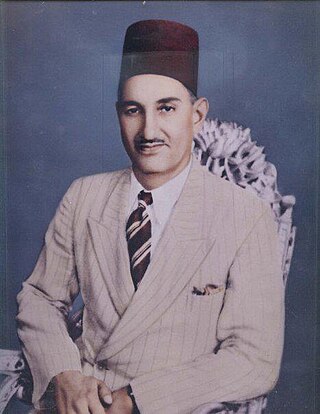Faisal Iqbal is a Pakistani cricket coach and former cricketer who played for Pakistani national cricket team in Tests and One Day Internationals.

Pir Ilahi Bux or Pir Ilahi Buksh was a Pakistani politician and activist who was a prominent member of the Pakistan Movement and who served as the Chief Minister of Sindh from 1948 to 1949.
Law enforcement in Pakistan is one of the three main components of the criminal justice system of Pakistan, alongside the judiciary and the prisons. The country has a mix of federal, provincial and territorial police forces with both general and specialised functions, but the senior ranks of all the provincial forces and most of the federal ones are manned by members of the Police Service of Pakistan (PSP). The PSP is one of the most prestigious part of the Central Superior Services, Pakistan's main civil service organisation. Federal law enforcement agencies are generally overseen by the Ministry of Interior of the Government of Pakistan, while provincial police forces are overseen by a department of the government of that province.

Pakistan International Airlines Flight 544, a Pakistan International Airlines Fokker F27, was hijacked on 25 May 1998, shortly after it took off from Gwadar International Airport, by three armed men belonging to Baloch Students Organization. The aircraft, with 33 passengers and 5 crew members aboard, had just arrived from Gwadar International Airport, Balochistan, and was set to land in Hyderabad Airport, Sindh. The hijackers demanded that the aircraft be flown to New Delhi, India. The Army's Special Service Group's Haideri Company, 7th Commando Zarrar Battalion, SSG Division, accompanied by members of the Pakistan Rangers, stormed the aircraft, while the Pakistan Police surrounded the plane. The operation concluded with all three hijackers arrested and sentenced to death by Pakistan, with no casualties.

The Sindh Police, is a law enforcement agency established in 1843 under a proclamation issued by Sir Charles James Napier, who became the conqueror of the State of Sindh by defeating the forces of the Talpur rulers at the Battle of Miani near Hyderabad on 20 March 1843. Ever since its inception, the organization was raised on the model of the Royal Irish Constabulary to maintain law and order and law enforcement in Sindh, Pakistan. The department serves an area of ~140,914km2 and has about 280,000 police officers and staff. As of 24 March 2024, Ghulam Nabi Memon is the Inspector-General of Police.

On June 15, 2013, the historical Quaid-e-Azam Residency, which housed the founder of Pakistan, Quaid-e-Azam Muhammad Ali Jinnah, in his last two months and ten days, was attacked and completely burnt down by militants belonging to the Balochistan Liberation Army. The reconstruction work was completed and the reconstructed Ziarat Residency was inaugurated on Independence Day which is on 14 Aug, 2014.

The Counter Terrorism Department (Urdu: سررشتہِ تحقیقاتِ جرائم ، پاکستان; CTD) formerly known as the Crime Investigation Department (CID), are crime scene investigation, interrogation, anti-terrorism, and intelligence bureaus of the provincial police services of Pakistan.
Qamar Ahmed is a Pakistani cricket journalist and former first-class cricketer who played for Sindh and Hyderabad cricket teams.

The Special Security Unit (SSU) is a specialized counterterrorism and security unit of the Sindh Police in Pakistan. It is a Karachi-based unit, with its operational jurisdiction extending throughout Sindh as a whole. It was established in 2010 in response to increased rates of terrorism. The unit reports to the IG Sindh and DIGP Security/Commandant Mr. Maqsood Ahmed is the founding head of the unit.
Suhai Aziz Talpur is a Pakistani law enforcement officer, serving as Assistant Superintendent of Police (ASP) since 2013, the third Sindhi woman to serve in the police force of the country. Talpur was praised for her leadership role in foiling the November 2018 terrorist attack against the Chinese consulate in Karachi.

The Sindh Rangers is a federal paramilitary force in Pakistan. It is one of nine Civil Armed Forces and is one of two Ranger forces with the other one being the Punjab Rangers, which operates in Punjab province. The corps operates administratively under the Interior Ministry of Pakistan, which consists of the Interior Secretary and Interior Minister and the Sindh Home Department which consists of the Home Secretary and Home Minister, but is usually commanded by officers on secondment from the Pakistan Army. Their primary purpose is to secure and defend about 912 km (567 mi) of the southern part of the border with neighbouring India. They are also often involved in major internal and external security operations with the regular Pakistani military and provide assistance to municipal and provincial police forces to maintain law and order against crime, terrorism and unrest.
The first event of the Quaid-e-Azam Inter Provincial Youth Games in Islamabad. President Mamnoon Hussain opened the first edition. First time Punjab Sindh Baluchistan KPK Islamabad Azad Jammu and Kashmir Gilgit-Baltistan and FATA teams participated Punjab won the first edition. The second Quaid-e-Azam Inter-Provincial Youth Games will start from 25 December with over 3700 participants making it the biggest sporting event in Pakistan.
Allah Dino Khawaja is a Pakistani police officer who serves in BPS-22 grade as the Federal Secretary for Ministry of Human Rights. A.D Khawaja is batchmates with prominent bureaucrats namely Fawad Hasan Fawad (PAS), Rizwan Ahmed (PAS), Sikandar Sultan Raja (PAS) and Hussain Asghar (PSP).
Moazzam Jah Ansari is a grade 22 officer of the Police Service of Pakistan who is currently serving as the Inspector General of Balochistan Police since August 2024. He has previously served as the Inspector General of Khyber Pakhtunkhwa Police along with holding posts such as the Commandant of the Frontier Constabulary (CFC/IGFC) and Inspector General of Balochistan Police, Pakistan.
Quaid-e-Azam Public School, Karachi is a not-for-profit boarding school located in Karachi, Pakistan. The school is run by the Sindh Madressah Board and is spread over 200-acre land.
Anoosh Masood Chaudhry is a Pakistani police officer who serves as the deputy director, Administration, for Elite Police of Punjab, Pakistan since 26 September 2019. She was named as Lahore's best crime fighter for 2018. She became the first female Assistant Superintendent of Police (ASP) from Khyber Pakhtunkhwa province of Pakistan on 11 December 2014.
Sharif al Mujahid was a Pakistani journalist, historian, author, and professor.

Sultan Ali Allana is a Pakistani banker who is chairman of Habib Bank Limited and a director of the Aga Khan Fund for Economic Development. He is a recipient of Hilal-i-Imtiaz in 2006 and Sitara-i-Imtiaz in 2022 for his services to Pakistan.

The Civil Armed Forces (CAF) are a group of nine paramilitary and gendarmerie organisations, separate and distinct from the regular Pakistan Armed Forces. They are responsible for maintaining internal security, helping law enforcement agencies, border control, counter-insurgency and counter-terrorism, riot control, and anti-smuggling under the Ministry of Interior. They frequently operate alongside the Pakistani military in response to natural disasters. During times of war they can have their command transferred to the Ministry of Defence, and effectively combined to form a reserve force for the Pakistani military.










